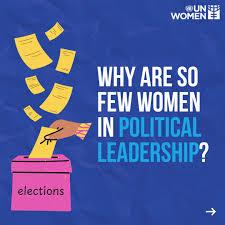
https://www.unwomen.org/en/news-stories/press-release/2025/06/womens-pol...
UN Women’s latest publication, Women Political Leaders 2025, reveals that women’s political leadership in executive positions is not merely stagnating – it is regressing. The persistent underrepresentation of women as Heads of State or Government and in key ministerial roles highlights widespread barriers and a fragile and uneven commitment to gender equality in political leadership.
Today, only 27 countries[1] are led by a woman Head of State or Government – up from 21 countries five years ago, while a staggering 103 countries have never had a woman in the highest executive office. This imbalance is also reflected in ministerial representation: women hold just 22.9 per cent of positions of Cabinet members heading ministries globally – down from 23.3 per cent in 2024, marking the first recorded decline in the number of women Cabinet ministers.
The number of parity cabinets – those with at least 50 per cent women – has dropped from 15 last year to just nine.[2] At the same time, the number of countries with no women in ministerial roles has increased from seven to nine in the past year alone.
Although still far from achieving parity, regions such as Europe and Northern America (31.4 per cent) and Latin America and the Caribbean (30.4 per cent) lead the global share of women Cabinet ministers, while Central and Southern Asia lags significantly behind at just 9 per cent.
“The world is witnessing the erosion of women’s political leadership at the very moment we need inclusive decision-making the most,” said Sima Bahous, Executive Director of UN Women. “When women are excluded from the highest levels of leadership, we all lose; as societies forfeit the more equitable, responsive governance that gender-balanced leadership makes possible.”
The decline in representation is unfolding against a backdrop of global backlash against women’s rights, compounded by widespread violence targeting women in politics both online and offline. This violence, spanning physical spaces and digital platforms alike, deters many women from entering or continuing careers in political leadership, undermining gender equality in representation.
Existing gender norms and practices significantly influence the allocation of cabinet portfolios. Men overwhelmingly hold Cabinet positions that determine national and global priorities, such as defence (87 per cent), financial and fiscal affairs (84 per cent) and foreign affairs (82 per cent). Women are most frequently appointed to positions related to gender equality (87 per cent) and family and children affairs (71 per cent).
Adding to these challenges is the decline in the number of gender equality ministries, a key institution for embedding gender equality in government policy and action. In 2020, there were approximately 80 ministries,[3] decreasing to 76 in 2024 and 74 in 2025.
UN Women calls on governments and political leaders to take bold, urgent action – through executive appointments, the use of temporary special measures like quotas, and stronger protections against political violence.
“Women’s full, equal, and meaningful participation in decision-making is not only a matter of justice – it is essential to fulfilling the promises of the Beijing Platform for Action and the Sustainable Development Goals. It is time to turn commitments into concrete action,” Bahous concluded.









